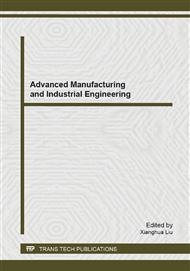[1]
A. Bachman and A. Janiak: Scheduling Jobs with Position-dependent Processing Times. Journal of the Operational Research Society, Vol. 55 (2004) , 257-264.
DOI: 10.1057/palgrave.jors.2601689
Google Scholar
[2]
D. Biskup: Single-machine Scheduling with Learning Considerations. European Journal of Operational Research, Vol. 115 (1999), 173-178.
DOI: 10.1016/s0377-2217(98)00246-x
Google Scholar
[3]
D. Biskup: A State-of-the-art Review on Scheduling with Learning Effects. European Journal of Operational Research, Vol. 188 (2008) 315-329.
DOI: 10.1016/j.ejor.2007.05.040
Google Scholar
[4]
G. Mosheiov: Parallel Machine Scheduling with a Learning Effect. Journal of Operational Research Society, Vol. 52 (2001) 1165-1169.
DOI: 10.1057/palgrave.jors.2601215
Google Scholar
[5]
A. Janiak and R. Rudek: Scheduling Jobs Under an Aging Effect. Journal of the Operational Research Society, Vol. 60 (2009)1-8.
Google Scholar
[6]
K. Rustogi and V.A. Strusevich: Simple Matching vs Linear Assignment in Scheduling Models with Positional Effects: A Critical Review. European Journal of Operational Research, Vol. 222(2012)393-407.
DOI: 10.1016/j.ejor.2012.04.037
Google Scholar
[7]
G. Mosheiov: Proportionate flow shops with general position-dependent processing times. Information Processing Letters, Vol. 111 (2011) 174-117.
DOI: 10.1016/j.ipl.2010.11.016
Google Scholar
[8]
C.L. Zhao Y.Q. Yin, T.C.E. Cheng and C.C. Wu: Single machine scheduling and due date assignment with rejection and position-dependent processing times. Journal of Industrial and Management Optimization, Vol. 10 (2014) 691-700.
Google Scholar
[9]
K. Rustogi and V. A Strusevich: Simple Matching vs Linear Assignment in Scheduling Models with Positional Effects: A Critical Review. European Journal of Operational Research, Vol. 222 (2012)393-407.
DOI: 10.1016/j.ejor.2012.04.037
Google Scholar
[10]
C. Koulamas and G.J. Kyparisis: Single-machine Scheduling Problems with Past-sequence -dependent Delivery Times, International Journal of Production Economics, Vol. 126 (2010) 264–266.
DOI: 10.1016/j.ijpe.2010.03.016
Google Scholar
[11]
Y.Q. Yin, M. Liu, T.C.E. Cheng, C.C. Wu and S.R. Cheng: Four single-machine scheduling problems involving due date determination decisions. Information Sciences, Vol. 251 (2013) 164-181.
DOI: 10.1016/j.ins.2013.06.035
Google Scholar
[12]
G. H. Hardy, J. E. Littlewood, and G. Polya. 1967. Inequalities. London: Cambridge University Press.
Google Scholar


